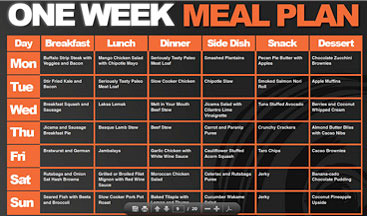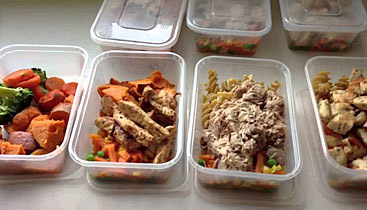5 BODYBUILDING DIET TIPS TO HELP YOU STAY CONSISTENT

Everyone, from beginners to advanced lifter, could use some bodybuilding diet tips.
When it comes to effectively gaining muscle and losing fat, both training and nutrition are equally important pieces of the overall puzzle. You can’t have one without the other, and both of these aspects of your bodybuilding program must be properly structured and carried out on a consistent basis if you want to see significant results.
While your workouts may only require you to be in the gym for an hour or so 3-5 days per week, proper nutrition is a full time job. It’s not that eating to build muscle and burn fat is inherently complicated, but it simply presents way more opportunities for you to slip up and ultimately fall off course with your overall plan.
The key to effective bodybuilding nutrition is consistency. It’s about structuring your daily meal plan in a way that is as simple, streamlined and sustainable as possible, so that you can simply go about your day with minimal to no guesswork involved and know that you’re on the right track toward your goals.
In today’s post I’m going to outline 5 simple but effective bodybuilding diet tips that you can employ to stack the odds as far in your favor as possible and maximize the chances that you’ll maintain proper nutritional habits over the long term….
Bodybuilding Diet Tip #1
Follow An Exact Step-By-Step Meal Plan

Tracking your diet on the go throughout the day can certainly work well once you gain more experience and really know how to track things properly. But if you’re having a tough time staying consistent with your diet, the simplest solution is to just map out exactly what you’re going to eat each day, in what specific amounts and at what times.
This way there will be zero guesswork involved, and you can go about your day without having to put specific thought into every single meal you consume.
Not only will this deliver superior results by ensuring that you’re landing in the proper calorie and macronutrient ranges for the day, but it will also keep you motivated and consistent since you’ll know that all you have to do is follow the set plan in front of you in order to reach your goals.
The way that you specifically employ this is up to you…
You could simply create one plan and eat the same things every day until you get tired of it… you could create a 3-day or 7-day plan and rotate through it… or you could map out a few possible options for each meal that have similar macronutrient profiles (for example, 3 different breakfasts, 3 lunches, 3 snacks etc.), and then choose the option you most prefer based on how you feel that day.
Bodybuilding Diet Tip #2
Prepare Your Meals In Advance

Rather than preparing every single meal on the fly throughout the day, set aside one or two days a week to pre-package your meals in bulk.
That way, when it comes time to eat, you can simply reach into the fridge, grab your pre-made food, and pop it in the microwave without having to go through the entire cooking and cleanup process every single time you need a meal.
Most people find that having these concentrated periods of cooking and packaging once or twice a week is a far more efficient approach for maintaining their diet long term, especially if they have a busy schedule or don’t particularly enjoy cooking.
Not only is this just a more streamlined way to approach your diet in general, but it will also save you a huge amount of time over the course of the week as well.
You can either prepare entire meals and store them in the fridge or freezer in Tupperware containers, or you just cook up a few of your main items in bulk that usually take longer to prepare, such as chicken breast, steak, fish, etc.
Bodybuilding Diet Tip #3
Base Your Diet Around Foods You Like

This tip sounds so obvious, yet many trainees fall into the trap of thinking that certain foods are somehow “mandatory” to include in their diet, and they end up choking them down on a daily basis even though they don’t like the taste.
This is totally unnecessary, counter-productive, and greatly increases the chances that you won’t stick to your nutrition plan long term.
Remember… your body does NOT view your diet in the context of individual food items. It only sees the big picture: the total calories, protein, carbs, fats, vitamins, minerals, fiber, and other micronutrients, and there are a virtually infinite number of different ways that you can reach these totals for yourself.
If you don’t like tuna, don’t eat tuna. If you don’t like eggs, don’t eat eggs. If you don’t like oatmeal, don’t eat oatmeal. No single food source is a must-have in your plan.
If you particularly enjoy blueberries and mangos, use those as your primary fruit sources. If you prefer turkey and salmon to chicken and beef, use those as your primary muscle building protein sources. If you’d rather have sweet potato in place of rice for your healthy carb sources, go that route.
If you simply take some time to plan your nutritional approach around the foods that you prefer for each major category (such as proteins, starchy carbohydrates, fruits, vegetables, and healthy fats), your diet will be far more enjoyable and your chances of long term success will be hugely increased.
(Check out my previous article that discusses what to eat to gain muscle and lose fat for a list of high quality foods in each category that you can pick from)
Bodybuilding Diet Tip #4
Optimize Your Daily Meal Layout And Frequency

What type of dietary structure do you most prefer when it comes to your individual appetite and schedule? Is it 3 larger meals consumed in the morning, afternoon and evening? 5 medium sized meals spread all throughout the day? 7 small meals consumed every couple hours?
The research on meal frequency and its effects on protein synthesis and basal metabolic rate are fairly clear: as long as you’re hitting your overall calorie and macronutrient needs for the day as a whole, the specific way in which you lay those meals out is essentially a non-issue when it comes to optimizing muscle growth and fat loss.
Nutrient digestion and absorption is an incredibly slow and gradual process, and forcing yourself to have a meal every 2-3 hours throughout the day (as was once considered essential in bodybuilding circles) is not only completely unnecessary but also increases the chances that you’ll get burned out and fall off track.
For that reason, just figure out what you need to consume for the day in terms of protein, carbohydrates, and fats, and then lay out your meals in the way you enjoy most and that maximizes your overall adherence to the diet.
(You can figure this out for yourself by checking out my recommended bulking diet and cutting macros which I outlined in previous posts, or you can simply automate the process with my bodybuilding macronutrient calculator)
Bodybuilding Diet Tip #5
Utilize A “Flexible Dieting” Approach

Assuming that around 80-90% of your diet is comprised of nutrient-dense, “clean” foods (such as lean proteins, minimally refined carbohydrates, and healthy fats), the other 10-20% can come from whatever sources you’d like as long as it fits into your overall daily calorie and macronutrient totals. (The only exception here are for foods that contain partially hydrogenated oils, as these should be strictly limited or eliminated altogether)
This is often referred to as the concept of “If It Fits Your Macros” or IIFYM for short.
As I stated earlier, your body does not view your nutrient intake within the context of individual food items. In almost all cases, there is no such thing as a food that is inherently “good” or “bad”; there is only a complete, overall diet that is “good” or “bad”.
Including a small amount of higher sugar and/or higher fat food here and there (I usually try to refrain from using the term “cheat meals” as it wrongly implies that you’re doing something outside the rules) is not going to negatively affect your muscle building or fat burning progress, and it will make your overall eating plan much more enjoyable while still delivering the same results.
One of the most important mindsets to apply to your bodybuilding diet plan as a whole is to stop thinking about it as a “diet” in the first place. Effective nutrition is not a quick-fix but rather an ongoing pursuit, and you need to consider what a sustainable lifelong approach to eating looks like for you.
If you’re constantly depriving yourself of the foods you enjoy most, there’s a much greater chance that you’ll simply become discouraged and quit. Figure out what you need in terms of overall daily calories and macronutrients (the level of detail that you apply here is dependent on your individual goals and situation), and then allocate a small percentage of that to allow for the foods you crave most.
By basing your “clean” food choices around those that you like best (as we covered in tip #3) AND also allowing yourself to indulge in the “flexible” foods you crave in controlled amounts, you’ll be able to structure a nutrition plan that you fully enjoy and that gets you into the best shape possible at the same time.
5 Tips To Help You Stay Consistent With Your Diet: Quick Review
So, here’s a quick recap of the 5 tips we just covered…
Tip #1: Create a structured daily eating plan for yourself. This way there will be no guesswork involved and you’ll already know exactly what to eat and when.
Tip #2: Prepare your meals in advance to save time and maximize efficiency.
Tip #3: Since no food in a bodybuilding diet is mandatory, take some time to figure out which foods you most enjoy when it comes to lean proteins, starchy carbs, fruits, vegetables, and healthy fats. Then, simply base your diet around those choices.
Tip #4: Don’t worry about the specific intervals between meals and instead just structure your meal frequency and layout in whatever way you most prefer based on your appetite and schedule.
Tip #5: Allocate 10-20% of your overall diet to indulge in the foods you crave most. As long as these foods fit into your nutrition plan as a whole in terms of total calories and macronutrients, it won’t negatively impact your results but will make your eating plan way more enjoyable.
If you found this article helpful, make sure to sign up for your FREE custom fitness plan below...





